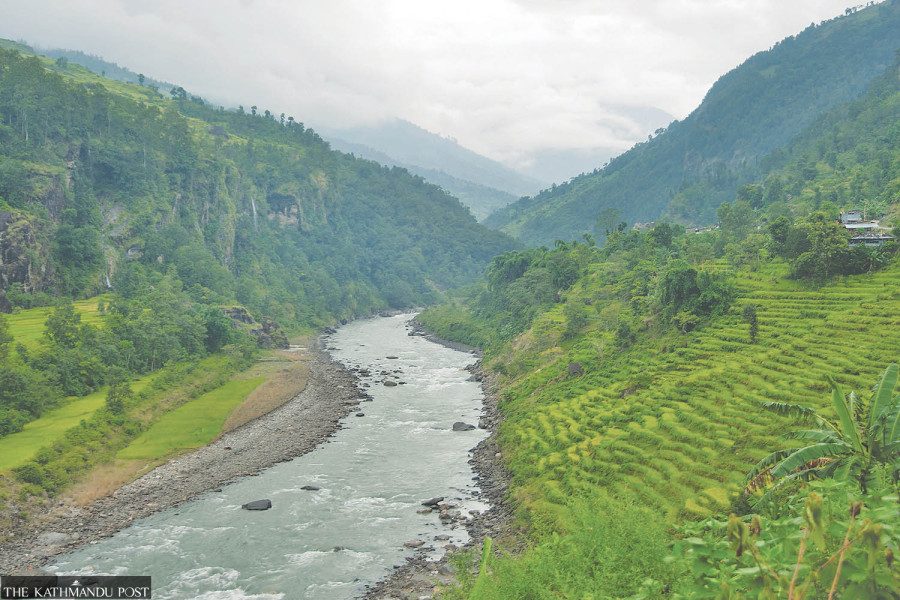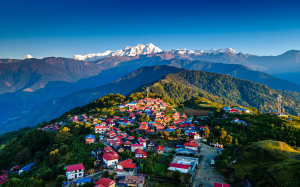Money
Business activity stalls in Budhi Gandaki project area
Government policy bans construction and land transactions in the proposed 1,200MW project area. Delayed work has left everyone worried.
Hariram Upreti
The Gandaki province has allocated Rs3 million to pave the road to Arughat bazaar, the second-largest business hub in Gorkha.
This is despite the government policy to ban the construction of structures on the lands allocated for the 1,200MW Budhi Gandaki hydropower project, including the areas the project may impact.
The government started land acquisition for the project years ago, but it has not been completed. The construction of the project, too, faces uncertainty.
The project is important from the energy security point of view. Except for Kulekhani, all other power projects are run-of-the-river undertakings whose capacity dips to as low as 40 percent in the dry season.
Because of the dominance of run-of-the-river projects, Nepal has been forced to buy electricity from India during winter, even though the country has an energy surplus in summer. According to the Nepal Electricity Authority, Nepal’s total installed capacity has reached 3,157MW.
The government has already spent over Rs42 billion paying compensation for acquiring land for the Budhi Gandaki project.
As the project failed to move, it has put everyone, including the landowners, in a dilemma.
The total land required for the project components is 56.22 hectares, and 49.62 hectares of it will be occupied permanently.
Even the blacktopping of a section of Mid-hill Highway has been stopped. Locals say construction and development activities have stalled in the areas affected by the project.
Arughat Bazaar, which carries 300 years of history, looks deserted.
“Before the construction of the Prithvi Highway in 1971, people from Kaski had to reach Kathmandu via Arughat Bazaar-Trishuli. Arughat used to be a place for people and traders to shelter,” said Buddhi Prasad Shrestha, a local of Arughat rural municipality-9.
“Though the construction of Prithvi Highway shadowed Arughat, the local business was not down.”
However, with the stopping of the transaction of the project-affected land, the construction of new houses has completely stopped. “People affected by the earthquakes of 2015 have not been able to construct houses.”
Traders said that business has declined by 70 percent in Arughat.
Before the government started acquiring land to build the project, the local traders of Chumnumbri, Dharche, and Arughat bought goods in Arughat. Land transactions in Arughat for settlement also boomed.
The market was vibrant as people migrated to Arughat for children's education. Trekkers' flow to Manaslu trails also kept the market busy.
But after the earthquake of April 2015, the market started losing its charm, locals said.
“Gorkha Bazaar was a happening market then of Dhading Besi, but now the business is not even 10 percent,” said Prem Kumar Shrestha, a resident of Bishalnagar, Dhading.
He said that as development work has stalled, labourers are unable to find work.
After the earthquake and the Covid pandemic, 70 percent of locals are estimated to have left Arughat.
With fewer business activities, small businesses are in trouble.
“We are in a dilemma. The businesses cannot expand because no one knows when the government will ask them to leave or vacate the areas for construction,” said Prem Kumar.
The locals who received the compensation for their land have shifted to Kathmandu and Chitwan.
“The ward also does not allocate a budget for development,” said Ganesh Kumar Shrestha.
As people migrate to new places, people like Ganesh Kumar are confused as they do not know where to go. “I have to start from zero in the new place. It’s difficult,” he said.
“If the hydropower moves forward prioritising the re-settlement, it will remove the confusion,” said Ganesh Kumar.
Thakur Prasad Khanal left Manuwa-1 and purchased five ana land in Bishal Nagar.
“We were surviving on agricultural and farm yields. Customers used to come to our field to buy vegetables. But now it's hard to sell even a bunch of green leafy vegetables or buffalo milk,” said Khanal. With no business, locals like Khanal say they had to quit farming.
People like Khanal said that the project also did not provide fair compensation.
“I have two ana of land. The total value of Rs300,000 for a hand, a traditional unit of measurement, is Rs3.3 million. But the compensation I received is Rs1.4 million,” said Khanal. “The compensation is discriminatory.”
Buddhi Prasad Shrestha of Arughat-9 said around 150 locals in Arughat Bazaar living on unregistered land and 100 tenants who built structures by leasing lands have not received compensation.
“Some locals have been living in Arughat for business leasing land since the Panchayat era. The project should address their grievances, too,” said Buddhi Prasad.
An initial environmental assessment report stated that the people affected by the project would be resettled on the two sides, making a ring road, said Hareram Dhakal, coordinator of Budhi Gandaki Hydropower Project National Concern Committee.
“Ring road has not been built yet.
Around Rs500 million has been allocated in the current fiscal year. “It’s peanuts,” said Dhakal.
Madhu Prasad Bhetwal, the project chief, said that Rs42.68 billion, or 95 percent of compensation, has been distributed to the project-affected people in Gorkha and Dhading. He said that the project would now address the unregistered land issues.
“Nearly 3,000 dissatisfied locals have filed complaints over compensation. We are studying them. In most cases, we must make field visits.”




 31.12°C Kathmandu
31.12°C Kathmandu.jpg)














